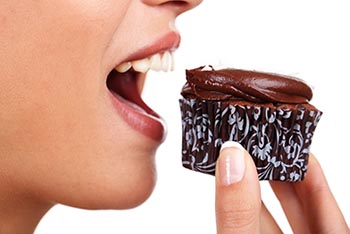Food cravings can guide you to eat something the body is nutritionally lacking or can be linked to emotional eating. Food cravings are regulated by the brain as is everything else you experience. After a while of not eating something ... like sugar ... the brain will stop craving it. How long until the cravings return varies - as most people revert back to old patterns. This is why most diets fail as do many relationships. You are your programmed codes.
A food craving is an intense desire to consume a specific food, and is different from normal hunger. It may or may not be related to specific hunger, the drive to consume particular nutrients that is well-studied in animals. In studies of food cravings, chocolate and chocolate confectioneries almost always top the list of foods people say they crave; this craving is referred to as chocoholism. Read more ...

Mmm ... Chocolate Cake! Why Some People Struggle to Resist Cravings Live Science - July 29, 2014
After a long day at work, it can be hard to resist the call of ice cream from the freezer. But some people are better than others at ignoring that call, and new research suggests the difference has to do with brain activity. Scientists already know a lot about why willpower fails, but not much is known about why some people have more self-control than others.
In the new study, researchers found that regions in the brain associated with reward and self-control would light up with activity when people looked at images of high-fat, tempting foods. The researchers could even predict the strength of a person's food cravings, the likelihood they would act on those cravings and the amount they would eat after giving in to the temptation - all just by looking at the brain-activity levels. People are not aware entirely of how much these cues can affect their cravings. In the future, it could help inform clinicians how to help people with eating disorders or how to help people who struggle with diet in general.
Lopez and a team of researchers used functional magnetic resonance imaging, or fMRI, to monitor certain regions of the brain for activity levels that might predict behavior. Specifically, they measured activity in a region of the brain associated with pleasure and reward called the nucleus accumbens, and another region of the brain associated with self-control, the inferior frontal gyrus.
The team recruited 31 female volunteers for the study. Lopez said they used a group of same-gender volunteers, because they first wanted to test if a relationship existed between brain activity and cravings at all. Follow-up studies will likely include men as well as women to test for differences in gender. The participants got initial fMRI scans while they were presented with a series of pictures. Half of the pictures showed high-calorie and high-fat foods, like cheeseburgers, french fries and desserts. The rest of the images were of things such as people and nature scenes. Then, during the next week, participants received a text message a few times a day on their phones, asking them to report their food desires and eating behavior. If they were having a craving, the researchers asked them to describe the craving, its intensity and whether they gave in to it.
The people who showed lots of brain activity in the reward region struggled with more intense food cravings and were much more likely to give in to the craving. Furthermore, those who showed high brain activity in the self-control region were more successful at fighting off the temptation. Those with low brain activity in the self-control region were 8.2 times more likely to give in than those with high brain activity, the researchers found.
Lopez said that future research in this field will likely revolve around techniques to help people improve their self-control. Other labs are already investigating techniques - such as mindful meditation and getting people to change the way they think about their cravings in the moment - as possible ways to improve self-control. Future research could also investigate how brain regions associated with reward and self-control could predict other addictive behaviors, such as binge drinking, gambling and risky sexual behavior.